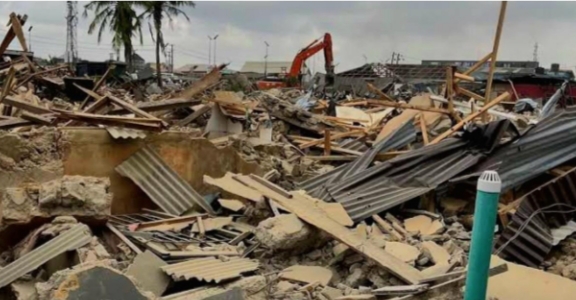Midnight de£molition leaves Lagos residents h0meless
Midnight demolition leaves Lagos residents homeless
Elderly residents and widows of the Amikanle community in the Alagbado area of Lagos State say the overnight demolition of shops and houses along the Powerline corridor on Friday, November 7, has crushed their means of livelihood and forced some of them to sleep on the streets.
Women between the ages of 60 and 65 told PUNCH Metro during separate interviews on Tuesday that the loss of their shops, inventories and long-standing family homes had pushed many of them into begging for survival.
Several displaced residents, many of them widowed, described the demolition as “sudden, forceful and carried out under heavy security surveillance.”
Some of the displaced residents who spoke to our correspondent amid tears pointed to injuries they claimed were sustained during the operation.
According to them, government officials stormed the community in the night with six bulldozers and allegedly threatened to arrest anyone who attempted to record the exercise.
“As the demolition was going on, anyone seen filming or showing dissent was thrown into a Black Maria,” a youth in the community identified only as Muiz said.
One of the victims, 63-year-old Olabisi Osho, said she had lived in her one-storey building at No. 44 Powerline Phase 2 for 28 years before it was torn down at midnight.
“We were initially told our buildings were not among those marked for demolition. But they suddenly came that night with policemen and started pulling down houses, including mine. Anyone who tried to make a video was arrested.”
Osho said she injured her head while fleeing the rubble and now sleeps in a trailer with her belongings.
“I can’t afford rent now. What is painful is that we are hearing they have started selling the land already,” she added.
Another resident, 64-year-old Oni Elizabeth, said her family had now suffered displacement twice due to government demolitions.
“They woke us up in the night to start packing our things. My husband’s first house at No. 36 Church Street, Agbelekale, was demolished years ago. Now, the second house we moved to at Awonisi, AIT Road, has also been demolished. I have no home again
Similarly, 66-year-old widow, Aina Adejare, who lost her late husband’s house, said, “We have lived here for over 30 years. I am helpless now and have nowhere to go. I just want the government to help me.”
Shop owners in the community told our correspondent that the loss of business had deepened their hardship.
A trader, Adebimpe Oduro, insisted her shop was not under any powerline structure.
“They said my shop was under the power line, but it wasn’t. After the demolition, there is nobody to sell to again. My customers have all left because everywhere is now desolate,” Oduro said.
She added that no compensation was given to her, lamenting, “We are hearing they want to lease the place to other people. All we ask for is help to start again. There is hunger already, and this has made it worse.”
Another widow, Esther Olaogun, who ran her shop for three years before it was also demolished, pleaded for the government’s intervention.
“All we are asking is for help to get back on our feet. I have nowhere to go and nothing to start with,” she said.
Another resident, Ishola Ikotun, said the demolition came barely a week after notices were issued. “I’ve been paying N10,000 monthly for that shop.
“They gave notice that it was under the power line, and within a week, they came and demolished everything. My wares were damaged. Now, I just want help. I am also a widow,” she explained.
A soft drink seller, Bisoye Lawal, who had worked in the area for six years, said, “I have nothing again. They said our shops were under the power line, but now we heard they want to give the shops to others. They didn’t even consider us.”
A gospel singer in the community, Testimony Jaga, who told our correspondent that he grew up in Alagbado, called for justice on behalf of the widows and elderly residents rendered homeless.
He said, “They demolished houses from Command down to the Amikanle area, claiming they were under the power line.
“People are sleeping under the bridge. Some could not be accounted for during the last heavy rainfall because their loads were outside.”
Jaga also alleged that the community had contributed millions in an attempt to prevent the demolition, but the efforts failed.
“If the demolition was to clear people from the powerline, why are they now building under the same powerline? Where is the compensation for people whose lives have been destroyed? ” he asked.
He stressed that the affected residents were not seeking confrontation.
“We don’t want to fight the government. We just want negotiation. If they are bringing BRT parks, supermarkets and mechanic villages, fine. We love this. But what happens to the people they displaced? ”
When contacted, the spokesperson for the Lagos State Building Control Agency, Adu Ademuyiwa, dismissed claims that the cleared land was being reallocated.
“The area is Amikanle. These are buildings under high tension. Both the federal and state governments have said no one should build under high tension.”
On whether the government would offer support to affected residents, he responded, “If they don’t have documents, what do they want the government to do? No sane government will allow its citizens to build under high tension. Nobody gave them papers to build there.”
He added that some residents repeatedly rebuilt structures after previous warnings.
“When the government chased them away, they would come back and erect another structure,” he said.
From Oworonshoki to Amikanle and other parts of Lagos, similar concerns have continued to trail the state government’s demolition exercises, with affected residents insisting that the operations lack empathy and humanitarian consideration.



